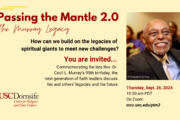A version of this article appeared in the Los Angeles Sentinel.
Our church needed money to build a new sanctuary. We had raised some money, but it was not enough. Our small faithful congregation had no more money to give. We were on the verge of giving up.
Then, Bishop T. Larry Kirkland challenged us to ask non-members to give money. At first, we were uncomfortable asking outsiders for help, but we asked. Since this is often an unfamiliar experience for churches, I want to share what the process of raising money from outside the church looks like.
The first step to raising money is identifying the problem or project. Choose one problem to fund. Most problems and projects are very similar: capital improvements, social services and housing development, for instance, are major problems.
There are hundreds of resources available to fix such community challenges. There are plenty of people with money willing to give. We have to ask people with money!
The next step is researching local and national resources. Donations are not limited to money. Ask for donations of technology, equipment, tools and the most valuable, human resources. The Internet is the best tool to research resources for raising money from wealthy donors, government agencies and foundations. Enroll into the USC Cecil Murray Center for Community Engagement’s Financial Literacy Institute to learn more about how to raise funds.
Wealthy individuals, foundations and government agencies are three fund-raising sources. Wealthy individuals give to worthy causes. They are moved by the impact the person or project has on the community. The approval process for individual donors is very quick. The downside is that these donors often require more personal attention and greater input into managing the project.
Government grants are the most difficult funds to receive. An organization must have the capacity, history, experience and capital to finance a government contract. Government grants are competitive, complex and highly political. Less than one percent of organizations qualify for a government contract and even fewer receives a government grants. Ask anyway!
Foundations are untapped sources of funding for communities of color. The Greenlining Coalition says less than one percent of foundation grants are made to African American and Latino organizations. One of the primary reasons is a failure to ask.
Foundations have a three-step application process. The first step is meeting the foundation’s program officer. The program officer is the gatekeeper. The program officer may ask for a two-page proposal describing a project. If the program officer likes the project, the next step is to submit a full proposal.
The proposal includes an explanation of the problem, proposed solution, program description, other resources, in-kind contributions, project outputs and outcomes, history of the organization, organizational capacity and project budget. The program officer has to present the request to the foundation board. The approval process may take three to six months. Please don’t be afraid, ask!
Because our church asked, a foundation helped finance the development of a new church. A church member made the introduction to the foundation, which gave us $300,000. Praise God!
After all, the bible says, “Ask, and it shall be given to you; seek, and ye shall find; knock, and it shall be opened unto you” (Matthew 7:7).
To find out how to create financially strong organizations and help families find financial security, join us for the Cecil Murray Center for Community Engagement’s Financial Literacy Program.
Photo Credit: Amrit/Flickr
Mark Whitlock is a contributing writer for the USC Center for Religion and Civic Culture.






